- Home
- Holly Black
The Wicked King (The Folk of the Air #2) Page 20
The Wicked King (The Folk of the Air #2) Read online
Page 20
This is no bedchamber, but a cage. Once I am pushed through, however, I discover that while I am still soaking wet, my surroundings are dry and filled with air I abruptly can’t breathe.
I choke, my body spasming. And up from my lungs comes all that water, along with a few pieces of partially digested fish.
Nicasia laughs.
Then, glamour heavy in her voice, she speaks. “Isn’t this a beautiful room?”
What I see is only a rough stone floor, no furniture, no nothing.
Her voice is dreamy. “You’ll love the four-poster bed, wrapped in coverlets. And the cunning little side tables and your own pot of tea, still steaming. It will be perfectly warm and delicious whenever you try it.”
She sets down a glass of sea water on the floor. I guess that’s the tea. If I drink it, as she suggests, my body will become quickly dehydrated. Mortals can go for a few days without fresh water, but since I was breathing sea water, I may already be in trouble.
“You know,” she says as I pretend to admire the room, turning around in it in awe, feeling foolish, “nothing I could do to you will be as terrible as what you’ll do to yourself.”
I turn to her, frowning in the pretense of puzzlement.
“No matter,” she says, and leaves me to spending the rest of the evening tossing and turning on the hard floor, trying to seem as though I feel it is the height of comfort.
I wake to terrible cramps and dizziness. Cold sweat beads on my brow, and my limbs shiver uncontrollably.
For the better part of a year, I have been poisoning my body every day. My blood is used to the doses, far higher than they were when I began. Addicted to them, so that now it craves what it once reviled. Now I can’t do without the poison.
I lie on the stone floor and try to marshal my thoughts. Try to remember the many times Madoc was on a campaign and tell myself that he was uncomfortable on each one. Sometimes he slept stretched out on the ground, head pillowed on a clump of weeds and his own arms. Sometimes he was wounded and fought on anyway. He didn’t die.
I am not going to die, either.
I keep telling myself that, but I am not sure I believe it.
For days, no one comes.
I give up and drink the sea water.
Sometimes I think about Cardan while I am lying there. I think about what it must have been like to grow up as an honored member of the royal family, powerful and unloved. Fed on cat milk and neglect. To be arbitrarily beaten by the brother you most resembled and who most seemed to care for you.
Imagine all those courtiers bowing to you, allowing you to hiss and slap at them. But no matter how many of them you humiliated or hurt, you would always know someone had found them worthy of love, when no one had ever found you worthy.
Despite growing up among the Folk, I do not always understand the way they think or feel. They are more like mortals than they like to believe, but the moment I allow myself to forget they’re not human, they will do something to remind me. For that reason alone, I would be stupid to think I knew Cardan’s heart from his story. But I wonder at it.
I wonder what would have happened if I told him that he wasn’t out of my system.
They come for me eventually. They allow me a little water, a little food. By then, I am too weak to worry about pretending to be glamoured.
I tell them the details I remember about Madoc’s strategy room and what he thinks about Orlagh’s intentions. I go over the murder of my parents in visceral detail. I describe a birthday, pledge my loyalty, explain how I lost my finger and how I lied about it.
I even lie to them, at their command.
And then I have to pretend to forget when they tell me to forget. I have to pretend to feel full when they have told me I feasted and to be drunk on imaginary wine when all I’ve had is a goblet of water.
I have to allow them to slap me.
I can’t cry.
Sometimes, when lying on the cold stone floor, I wonder if there’s a limit to what I will let them do, if there is something that would make me fight back, even if it dooms me.
If there is, that makes me a fool.
But maybe if there isn’t, that makes me a monster.
“Mortal girl,” Balekin says one afternoon when we’re alone in the watery chambers of the palace. He does not like using my name, perhaps because he doesn’t like having to recall it, finding me as disposable as all the human girls who have come through Hollow Hall.
I am weak with dehydration. They regularly forget to give me fresh water and food, enchanting me illusory sustenance when I beg for it. I am having difficulty concentrating on anything.
Despite the fact that Balekin and I are alone in a coral chamber, with guards swimming patrols at intervals that I count automatically, I do not even try to fight and flee. I have no weapon and little strength. Even were I able to kill Balekin, I am not a strong enough swimmer to make it to the surface before they caught me.
My plan has narrowed to endurance, to surviving hour by hour, sunless day by day.
Perhaps I cannot be glamoured, but that doesn’t mean I cannot be broken.
Nicasia has said that her mother has many palaces in the Undersea and that this, built into the rock of Insweal and along the seafloor beneath it, is only one of them. But for me, it is a constant torment to be so close to home and yet leagues beneath it.
Cages hang in the water all through the palace, some of them empty, but many of them containing mortals with graying skin, mortals who seem as though they ought to be dead but occasionally move in ways that suggest they are not. The drowned ones, the guards sometimes call them, and more than anything, that’s what I fear becoming. I remember thinking I’d spotted the girl I pulled out of Balekin’s house at Dain’s coronation, the girl that threw herself into the sea, the girl who’d certainly drowned. Now I am not so sure I was wrong.
“Tell me,” Balekin says today. “Why did my brother steal my crown? Orlagh thinks she understands, because she understands the craving for power, but she doesn’t understand Cardan. He never much cared for hard work. He liked charming people, sure. He liked making trouble, but he despaired of real effort. And whether or not Nicasia would admit it, she doesn’t understand, either. The Cardan she knows might have manipulated you, but not into this.”
This is a test, I think nonsensically. A test where I have to lie, but I am afraid my ability to make sense has deserted me.
“I am no oracle,” I say, thinking of Val Moren and the refuge he’s found in riddles.
“Then guess,” he says. “When you paraded in front of my cell in the Tower of Forgetting, you suggested it was because I’d had a firm hand with him. But you of all people must believe he lacked discipline and that I sought his improvement.”
He must be remembering the tournament that Cardan and I fought and the way he tormented me. I am tangled up in memories, in lies. I am too exhausted to make up stories. “In the time I knew him, he drunkenly rode a horse through a lesson from a well-respected lecturer, tried to feed me to nixies, and attacked someone at a revel,” I say. “He did not seem to be disciplined. He seemed to have his way all the time.”
Balekin seems surprised. “He sought Eldred’s attention,” he says finally. “For good or for ill, and mostly for ill.”
“Then perhaps he wants to be High King for Eldred’s sake,” I say. “Or to spite his memory.”
That’s seems to draw Balekin’s attention. Though I said it only to suggest something that would misdirect him from thinking too much about Cardan’s motives, once it comes out of my mouth, I ponder whether there isn’t some truth to it.
“Or because he was angry with you for chopping off Eldred’s head. Or being responsible for the deaths of all his siblings. Or because he was afraid you might murder him too.”
Balekin flinches. “Be quiet,” he says, and I go gratefully silent. After a moment, he looks down at me. “Tell me which of us is worthy of being High King, myself or Prince Cardan?”
“You
are,” I say easily, giving him a look of practiced adoration. I do not point out that Cardan is no longer a prince.
“And would you tell him that yourself?” he asks.
“I would tell him whatever you wish,” I say with all the sincerity I can wearily muster.
“Would you go to him in his rooms and stab him again and again until his red blood ran out?” Balekin asks, leaning closer. He says the words softly, as though to a lover. I cannot control the shudder that runs through me, and I hope he will believe it is something other than disgust.
“For you?” I ask, closing my eyes against his closeness. “For Orlagh? It would be my pleasure.”
He laughs. “Such savagery.”
I nod, trying to rein in overeagerness at the thought of being sent on a mission away from the sea, at having the opportunity for escape. “Orlagh has given me so much, treated me like a daughter. I want to repay her. Despite the loveliness of my chambers and the delicacies I am given, I was not made to be idle.”
“A pretty speech. Look at me, Jude.”
I open my eyes and gaze up at him. Black hair floats around his face, and here, under the water, the thorns on his knuckles and running up his arms are visible, like the spiky fins of a fish.
“Kiss me,” he says.
“What?” My surprise is genuine.
“Don’t you want to?” he asks.
This is nothing, I tell myself, certainly better than being slapped. “I thought you were Orlagh’s lover,” I tell him. “Or Nicasia’s. Won’t they mind?”
“Not in the least,” he tells me, watching carefully.
Any hesitation on my part will seem suspicious, so I move toward him in the water, pressing my lips against his. The water is cold, but his kiss is colder.
After what I hope is a sufficient interval, I pull back. He wipes his mouth with the back of his hand, clearly disgusted, but when he stares down at me, there’s greed in his eyes. “Now kiss me as though I were Cardan.”
To buy myself a moment of reflection, I gaze into his owl eyes, run my hands up his thorned arms. It is clearly a test. He wants to know how much control he has over me. But I think he wants to know something else, too, something about his brother.
I force myself to lean forward again. They have the same black hair, the same cheekbones. All I have to do is pretend.
The next day, they bring me a pitcher of clear river water, which I guzzle gratefully. The day after that, they begin to prepare me to return to the surface.
The High King has made a bargain to get me back.
I think back over the many commands I gave him, but none was specific enough to have ordered his paying a ransom for my safe return. He had been free of me, and now he is willingly bringing me back.
I do not know what that means. Perhaps politics demanded it, perhaps he really, really didn’t like going to meetings.
All I know is that I am giddy with relief, wild with terror that this is some kind of a game. If we do not go to the surface, I fear I will not be able to hide the pain of disappointment.
Balekin “glamours” me again, making me repeat my loyalty to them, my love, my murderous intent toward Cardan.
Balekin comes to the cave, where I am pacing back and forth, each scuff of my bare feet on the stone loud in my ears. I have never been so much alone, and I have never had to play a role for this long. I feel hollowed out, diminished.
“When we return to Elfhame, we won’t be able to see each other often,” he says, as though this is something I will greatly miss.
I am so jumpy that I do not trust myself to speak.
“You will come to Hollow Hall when you can.”
I wonder at the idea that he anticipates living in Hollow Hall, that he doesn’t expect to be put in the Tower. I suppose his freedom is part of the price of my release, and I am surprised all over again that Cardan agreed to pay it.
I nod.
“If I need you, I will give you a signal, a red cloth dropped in your path. When you see it, you must come immediately. I expect that you will be able to fabricate some excuse.”
“I will,” I say, my voice coming out too loud in my ears.
“You must regain the High King’s trust, get him alone, and then find a way to kill him. Do not attempt it if people are around. You must be clever, even if it takes more than one meeting. And perhaps you can find out more of your father’s schemes. Once Cardan is dead, we will need to move fast to secure the military.”
“Yes,” I say. I take a breath and then dare ask what I really want to know. “Do you have the crown?”
He frowns. “Very nearly.”
For a long moment, I do not speak. I let the silence linger.
Into it, Balekin speaks. “Grimsen needs you to finish your work before he can make it. He needs my brother dead.”
“Ah,” I say, my mind racing. Once, Balekin risked himself to save Cardan, but now that Cardan stands between him and the crown, he seems willing enough to sacrifice his brother. I try to make sense of that, but I can’t focus. My thoughts keep spiraling away.
Balekin smiles a shark’s grin. “Is something the matter?”
I am almost broken.
“I feel a little faint,” I say. “I don’t know what could be wrong. I remember eating. At least I think I remember eating.”
He gives me a concerned look and calls for a servant. In a few moments, I am brought a platter of raw fish, oysters, and inky roe. He watches in disgust as I devour it.
“You will avoid all charms, do you understand? No rowan, no bundles of oak, ash and thorn. You will not wear them. You will not so much as touch them. If you are given one, you will cast it into a fire as soon as you can conceal doing so.”
“I understand,” I say. The servant has brought no more fresh water for me, but wine instead. I drink it greedily with no care for the strange aftertaste or how it goes to my head.
Balekin gives me more commands, and I try to listen, but by the time he leaves, I am dizzy from the wine, exhausted and sick.
I curl up on the cold floor of my cell and for a moment, right before I close my eyes, I can almost believe I am in the grand room they have been conjuring for me with their glamours. Tonight, the stone feels like a feather bed.
The next day my head pounds as I am once again dressed, and my hair is braided. Merfolk put me in my own clothes—the silver dress I wore to Taryn’s wedding, now faded from exposure to salt and frayed from being picked at by Undersea creatures. They even strap Nightfell onto me, although the scabbard is rusted, and the leather looks as though something has been feasting on it.
Then I am taken to Balekin, dressed in the colors and wearing the sigil of the Undersea. He looks me over and hangs new pearls in my ears.
Queen Orlagh has assembled a huge procession of sea Folk. Merfolk, riders on enormous turtles and sharks, the selkies in their seal form, all cutting through the water. The Folk on the turtles carry long red banners that fan behind them.
I am seated on a turtle, beside a mermaid with two bandoliers of knives. She grips me firmly, and I do not struggle, though it is hard to keep still. Fear is terrible, but the combination of hope and fear is worse. I careen between the two, my heart beating so fast and my breaths coming so quickly that my insides feel bruised.
When we begin to rise, up and up and up, a sense of unreality grips me.
We crest the surface in the narrow stretch between Insweal and Insmire.
On the shore of the island, Cardan sits in a fur-lined cloak, regal on a dappled gray steed. He is surrounded by knights in armor of gold and green. To one side of him is Madoc, on a sturdy roan. To the other is Nihuar. The trees are full of archers. The hammered gold of the oak leaves on Cardan’s crown seems to glow in the dimming light of sunset.
I am shaking. I feel I may shake apart.
Orlagh speaks from her place at the center of our procession. “King of Elfhame, as we agreed, now that you have paid my price, I have secured the safe return of your seneschal
. And I bring her to you escorted by the new Ambassador to the Undersea, Balekin, of the Greenbriar line, son of Eldred, your brother. We hope this choice will please you, since he knows so many customs of the land.”
Cardan’s face is impossible to read. He doesn’t look at his brother. Instead, his gaze goes impossibly to me. Everything in his demeanor is icy.
I am small, diminished, powerless.
I look down, because if I don’t, I am going to behave stupidly. You have paid my price, Orlagh said to him. What might he have done for my return? I try to recall my commands, to recall whether I forced his hand.
“You promised her whole and hale,” says Cardan.
“And you can see she is so,” Orlagh says. “My daughter Nicasia, Princess of the Undersea, will help her to the land with her own royal hands.”
“Help her?” says Cardan. “She ought to need no help. You have kept her in the damp and the cold for too long.”
“Perhaps you no longer want her,” Orlagh says. “Perhaps you would bargain for something else in her place, King of Elfhame.”
“I will have her,” he says, sounding both possessive and contemptuous at once. “And my brother will be your ambassador. It shall all be as we agreed.” He nods toward two guards, who wade out to where I am sitting and help me down, help me to walk. I am ashamed of my unsteady legs, of my weakness, of the ridiculousness of still being dressed in Oriana’s utterly unsuitable dress for a party long over.
“We are not yet at war,” says Orlagh. “Nor are we yet at peace. Consider well your next move, king of the land, now that you know the cost of defiance.”
The knights guide me onto the land and past the other folk. Neither Cardan nor Madoc turn as I pass them. A carriage is waiting a little ways into the trees, and I am loaded inside.
One knight removes her helm. I have seen her before, but I do not know her. “The general has instructed me to take you to his home,” she says.
“No,” I say. “I have to go to the palace.”
She does not contradict me, neither does she relent. “I must do as he says.”

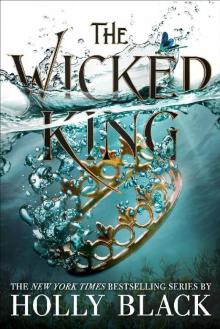 The Wicked King (The Folk of the Air #2)
The Wicked King (The Folk of the Air #2)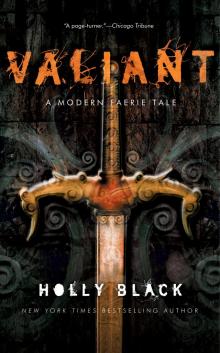 Valiant
Valiant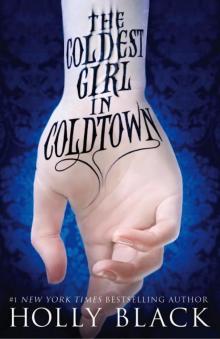 The Coldest Girl in Coldtown
The Coldest Girl in Coldtown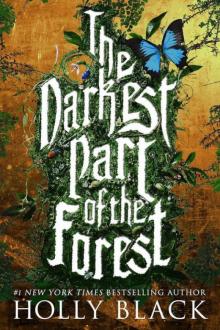 The Darkest Part of the Forest
The Darkest Part of the Forest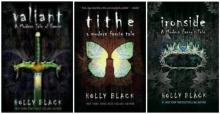 Tithe
Tithe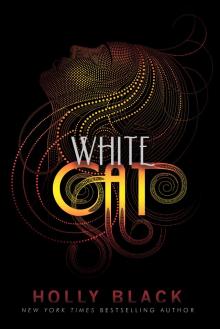 White Cat
White Cat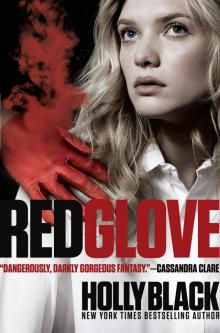 Red Glove
Red Glove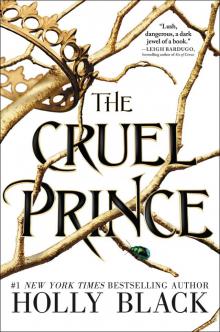 The Cruel Prince
The Cruel Prince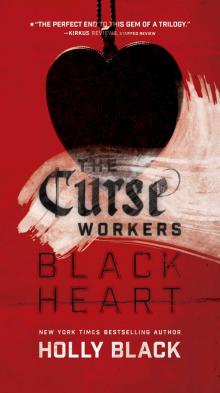 Black Heart
Black Heart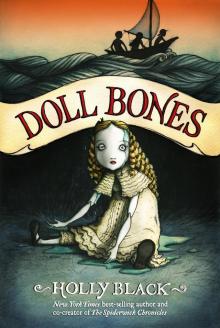 Doll Bones
Doll Bones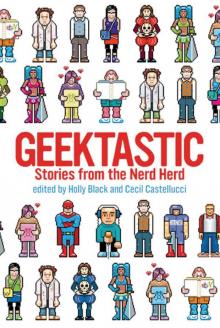 Geektastic: Stories from the Nerd Herd
Geektastic: Stories from the Nerd Herd Zombies Vs. Unicorns
Zombies Vs. Unicorns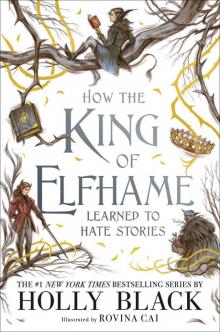 How the King of Elfhame Learned to Hate Stories
How the King of Elfhame Learned to Hate Stories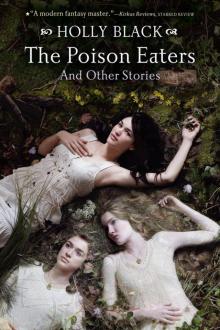 The Poison Eaters and Other Stories
The Poison Eaters and Other Stories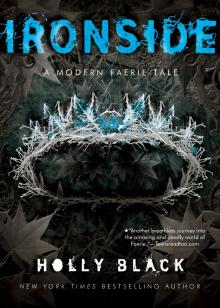 Ironside
Ironside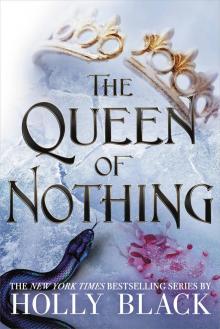 The Queen of Nothing
The Queen of Nothing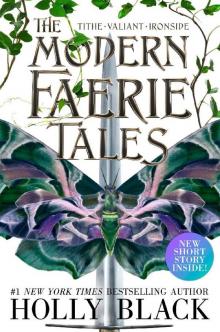 Modern Faerie Tales
Modern Faerie Tales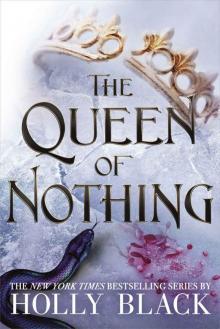 The Queen of Nothing (The Folk of the Air #3)
The Queen of Nothing (The Folk of the Air #3)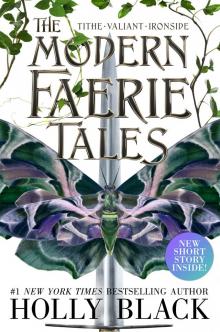 The Modern Faerie Tales
The Modern Faerie Tales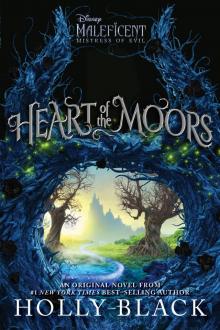 Heart of the Moors
Heart of the Moors The Golden Tower
The Golden Tower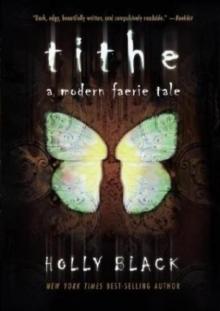 Tithe mtof-1
Tithe mtof-1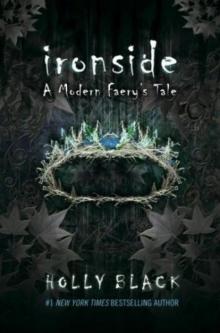 Ironside mtof-3
Ironside mtof-3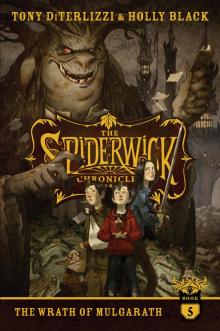 The Wrath of Mulgarath
The Wrath of Mulgarath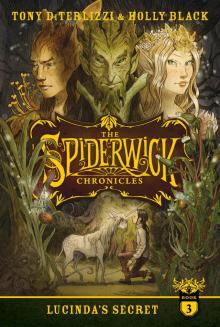 Lucinda's Secret
Lucinda's Secret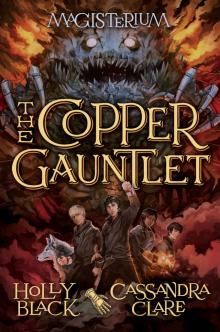 The Copper Gauntlet
The Copper Gauntlet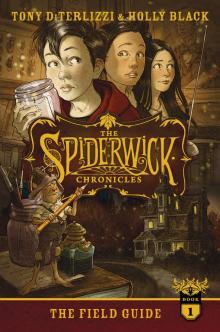 The Field Guide
The Field Guide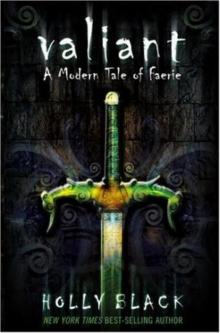 Valiant mtof-2
Valiant mtof-2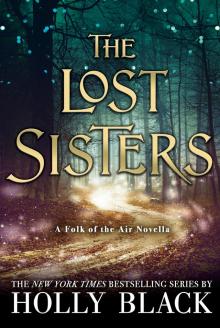 The Lost Sisters
The Lost Sisters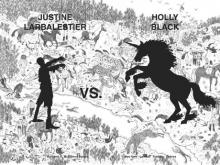 Zombies vs. Unicorns
Zombies vs. Unicorns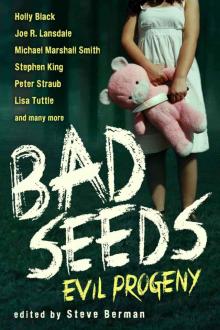 Bad Seeds: Evil Progeny
Bad Seeds: Evil Progeny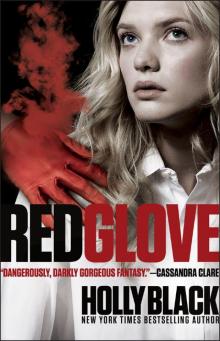 Red Glove (2)
Red Glove (2)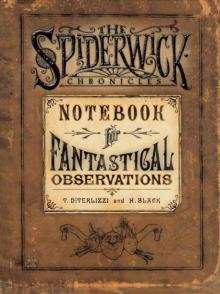 Notebook for Fantastical Observations
Notebook for Fantastical Observations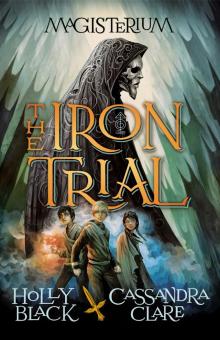 The Iron Trial
The Iron Trial Welcome to Bordertown
Welcome to Bordertown